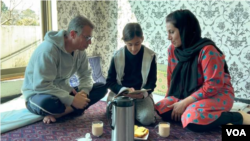The Sultani family was nearing the final stages of its case to resettle in the United States, but the plan was disrupted after President Donald Trump signed an executive order on Jan. 20 suspending the relocation of refugees to the U.S.
"My family and I couldn’t sleep at night" since the executive order was signed, said 50-year-old Ahmad Zahir Sultani, who fled to Pakistan alongside his wife and four children a few months after the Taliban seized power in Afghanistan in August 2021.
"We are very worried ... as we face an uncertain future," said Sultani, who worked with U.S.-run projects in Afghanistan before the U.S. pulled out of the country in 2021.
Just hours after his swearing-in as the 47th president of the U.S., Trump signed the executive order suspending the U.S. Refugee Admissions Program as of Jan. 27. The Sultani family was identified as a Priority 1 case for resettlement under that program.
"This order suspends the USRAP until such time as the further entry into the United States of refugees aligned with the interest of the United States," stated the order.
The order calls on the secretary of the Homeland Security Department, in consultation with the secretary of state, to report to the president within 90 days if the program "would be in the interests of the United States."
The order added that every 90 days, a report would be submitted to the president until he "determine[s] that resumption of the USRAP is in the interests of the United States."
Sultani and other Afghan refugees who have been waiting in Pakistan for resettlement in the U.S. told VOA that staying in Pakistan would be "very difficult" for them as the crackdown on Afghan refugees continues in Islamabad, where the Sultanis currently reside.
"We are facing harassment and arrests by the police [in Pakistan]. And we can’t go back to Afghanistan as we fled because of the threats there," Sultani said.
According to Pakistan’s Foreign Office in July, among more than 44,000 Afghans living in Pakistan to be relocated to third countries, about 25,000 Afghan refugees are waiting to be resettled in the U.S.
Fahimi Zahid, an Afghan activist living in Islamabad, told VOA that after the suspension of their relocation program to the U.S., Afghan refugees in Pakistan are "very concerned" about their future in Pakistan.
"In the past, refugees had a hope that the U.S. was in talks with Pakistan to ensure they wouldn’t face any harassment," she said, "but after the executive order, it is for sure that Afghans would face further harassment and deportation."
According to the U.S. State Department, more than 180,000 Afghans were relocated in the U.S. from August 2021, after the Taliban seized power in Afghanistan, to December 2024.
Thousands of Afghans who helped the U.S. during its two-decade war in Afghanistan are still waiting to be relocated to the U.S.
Shawn VanDiver, the president of AfghanEvac, a California-based coalition of organizations helping the U.S., told VOA that until the USRAP resumes, "there won’t be any travel. Refugees won’t be flying here or anywhere else."
U.S. media reported Wednesday that the flights of Afghan refugees who were supposed to be relocated to the U.S. were canceled only days before the order would go into effect.
VanDiver said the order mainly would affect Afghan refugees with Priority 1 and Priority 2 cases.
He said he and others at AfghanEvec are trying to have Trump issue "an exemption for Afghans."
"People that pass security and waiting medical and all that, we got to make sure they get here," he said.
VanDiver noted that somewhere between 150,000 to 200,000 Afghans have resettlement cases.
Sultani said that he and other Afghan refugees who waited for years to be relocated to the U.S. now face an uncertain future.
"Going back to Afghanistan is no option for us, and here [in Pakistan] we face many problems," he said.







